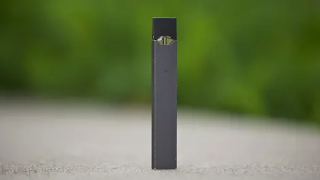Juul pulled almost all of its flavored nicotine pods other than menthol and mint off the market last year under pressure from the Food and Drug Administration, which under recently departed Administrator Scott Gottlieb was pursuing a hardline stance on the vaping industry and specifically on Juul, which has been repeatedly accused of knowingly marketing to teenagers. But if Juul voluntarily taking its flavored pods off the market had any impact at all, it’s been largely wiped out by a thriving cottage industry in knockoff Juul pods, according to the New York Times.
The Times reports that while Gottlieb proposed in his last few weeks that stores be required to hold flavored pods in an area secured from minors, his departure has left unclear the status of that possible change to federal policy. In the meantime, a number of competitors selling nicotine pods advertised as compatible with Juul devices has sprung up, with the company flailing around in court to keep the copycats out:
Juul has filed numerous lawsuits, and complaints with the International Trade Commission, seeking to beat back the cheaper copycat devices and pods... The company is also targeting sellers of counterfeit vaping devices and pods sold under the Juul name, and training federal customs officials to catch them at ports of entry.... The company has filed patent infringement claims against 21 manufacturers and sellers of copycat devices and pods... Most of those companies agreed to stop selling their similar products, but three did not, according to Juul: Eonsmoke, based in New Jersey, which uses factories in China; Ziip, based in China; which makes many different brands of nicotine pods and devices; and Vapor4Life, an Illinois-based seller of pods, devices and other goods.
Juul spokesperson Joshua Raffel also told the paper that U.S. customs officials have made at least 37 seizures of counterfeit products that the company is aware of this year, as well as sent 278 cease-and-desist letters.
But according to the Times, estimates of Eonsmoke’s business alone have shot from $5.3 million in revenue in 2018 to an estimated $43.6 million so far this year. The company has faced scrutiny from the FDA and state authorities, with Massachusetts Attorney General Maura Healey filing a lawsuit in May claiming that the company marketed to minors and failed to implement effective age verification. (If that sounds familiar, it’s because that is pretty much exactly the accusations hurled at Juul.) Along with competitor Ziip, Eonsmoke has argued in court that Juul’s technology amounts to a simple vaporizer and that the titan’s patents are invalid.
This could be reasonably interpreted as an indictment of the idea the vaping industry can regulate itself (wow, big surprise there). Action on Smoking & Health’s deputy director for policy, Chris Bostic, told the Times that Juul’s enforcement actions have clearly not been working, “[b]ut from a purely public health perspective, an [International Trade Commission] decision in their favor would at least get some products aimed at children off the market.”
On the other hand, the paper noted that while Juul told Congress in April that it would not return its flavored pods to stores, it has continued to insist “it still has the legal right, under F.D.A. rules, to bring back dozens of its own sweet flavors that it once sold in very limited release.” Hmm.
Last month, a federal judge ordered the FDA to impose a 10-month deadline for submissions of e-cigarette applications, finding it had overstepped its authority by allowing the products to stay on the market until 2022 without regulatory approval. Gottlieb told CNBC around that time (subsequent to his departure from the FDA) that he believed Juul is very unlikely to ever win FDA approval, saying that “[t]hey have so much historical youth use with their product. I don’t know how Juul gets through an application process.”
While Gottlieb added that Juul may be able to scrape together some sort of child-proof product at some point, he noted: “if applications are required to be due sooner, they won’t have time to do that.” The Times noted that Juul has been running ad campaigns demanding the government raise the legal age required to purchase nicotine products to 21. That is, of course, an idea worth considering, but it could also be reasonably described as a totally obvious attempt by Juul to deflect criticism of its documented role in the teen vaping epidemic by shifting the goalposts just months after it got partially bought out by Big Tobacco. (Strong overtones of the National Rifle Association yelling about mental health here.)
In the meantime, the Washington Post noted, there is growing evidence that Juul and other e-cigarette products may be having a serious impact on the health of some younger users. That includes over a hundred reports of seizures, “signs of nicotine toxicity, a condition previously seen in young children who accidentally ingested nicotine gum,” and reports of respiratory problems in some users.

No comments:
Post a Comment